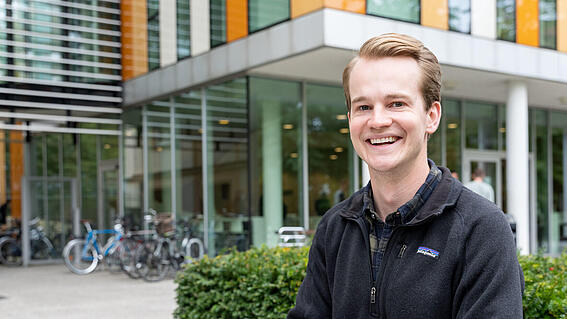Mr. Heidepriem, what is the first thing that comes to your mind when you think of our university?
Bucerius Law School has a great energy about it. The school combines a deep focus on academics with a lighthearted appreciation for a good time. Those two things aren’t easy to embody at the same time, but Bucerius Law School does it.
Could you give us a quick overview over your academic career?
I attended university at Arizona State University, where I studied Philosophy and Political Science and spent a summer studying at the London School of Economics. Next I completed law school at Georgetown University Law Center, during which I had my exchange semester at Bucerius Law School.
After working for two federal judges for a few years, I entered private practice and added teaching to my workload when I started as an adjunct professor of Law at the University of South Dakota Knudson School of Law.
Which legal issues are you hoping to research on while being at Bucerius Law School?
The research looks at arbitrations where Indigenous peoples and foreign investors clash, specifically in the context of disputes based on an international investment agreements. While international human rights law and international investment law are typically isolated from each other, I’m considering how they can coexist in an investor-state dispute.
I am interested in recent developments in Canadian law, like Canada’s new law fully embracing and seeking to implement the U.N. Declaration on the Rights of Indigenous Peoples. My research will investigate what application that may have for arbitrations grounded in international investment agreements Canada has formed with states around the globe.
What makes your area of research relevant? Please explain.
Developments in Canadian law as recent as June 2021 are unique in this area of research. They present an opportunity to explore how future arbitrations flowing from the dispute settlement mechanisms set forth in international investment agreements may have to reckon more directly with the rights of Indigenous peoples.
You have been to Bucerius Law School before. What did you like most about Bucerius Law School during your previous stay?
Bucerius Law School does a great job making everyone feel like they are part of the school’s social fabric. The school had a top-notch faculty available for courses and questions about the legal field, and its social events allowed students to form lasting friendships.
What made you come back to conduct your research here?
I was thrilled by the prospect of living in Hamburg while having a discrete period of time to devote to legal research and writing. As someone who has had to balance an interest in academic legal work with a separate full-time job practicing law, I value the freedom to form my own schedule and pursue academic work at my own pace.
What was the most rewarding aspect of your stay so far?
The welcoming nature of the faculty and the international office exceeded my expectations. Within my first couple days on the campus, Professor Mehrdad Payandeh invited me to lunch so we could discuss my research and get to know each other. I also appreciate having my own workspace so I can focus and feel comfortable in my own environment.
Which piece of advice would you give to others planning on researching at Bucerius Law School?
Just apply. Living in another country can be difficult, and being away from your home life for three months might be daunting, but if it can work in your long-term schedule, the rich cultural experience will pay dividends down the road. Bucerius Law School is a first-rate facility for ensuring the experience is a deeply rewarding time for progress in academic work.
How do you like the city of Hamburg? Did you have any challenges in settling here again?
Hamburg is wonderful. Despite being Germany’s second biggest city, I found that few people traveling to Germany consider a visit. That might be an advantage for Hamburg, because it affords you a major European city that feels as genuine as a remote village in the country. Being a big city, finding an apartment is tricky, and my search was no exception, but the upside is that I’m in a new neighborhood I wouldn’t have thought of otherwise.
Mr. Heidepriem, thanks for the interview.


